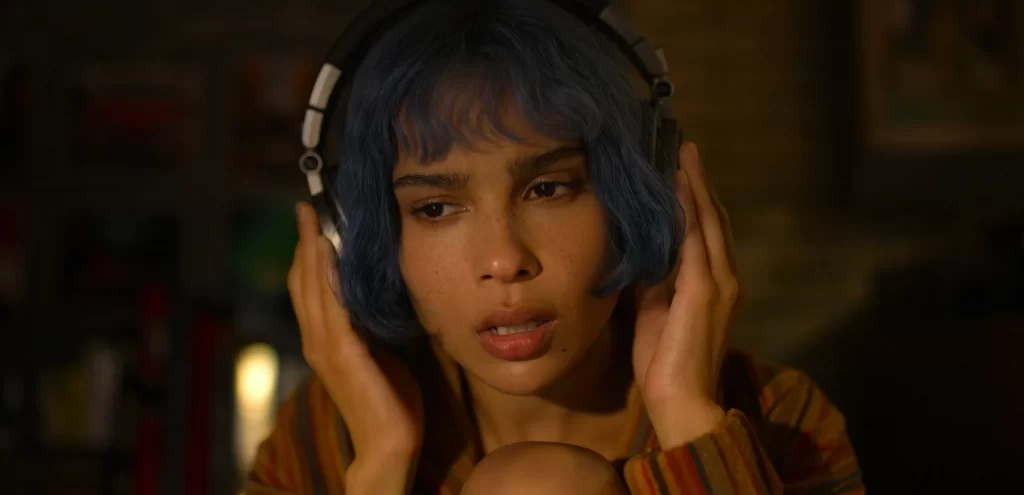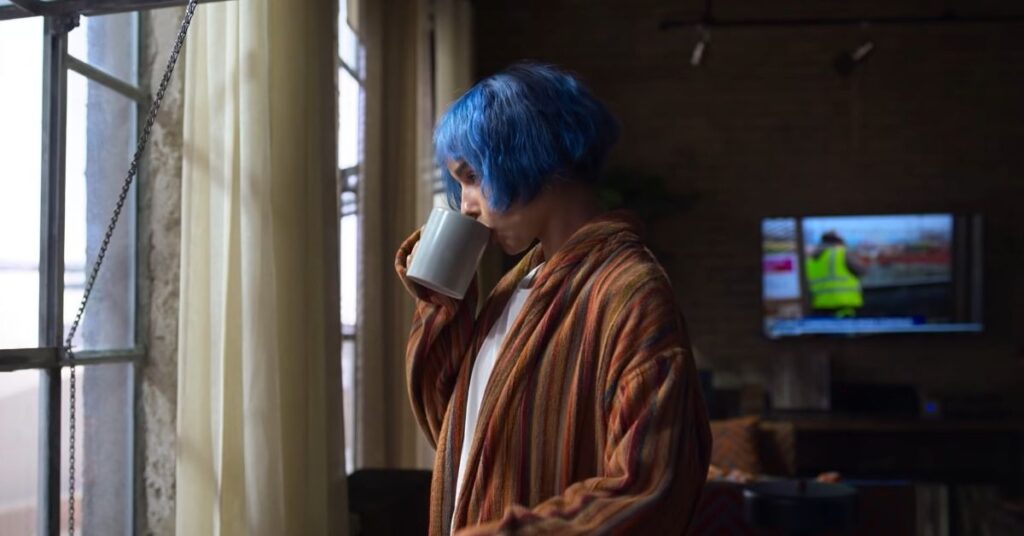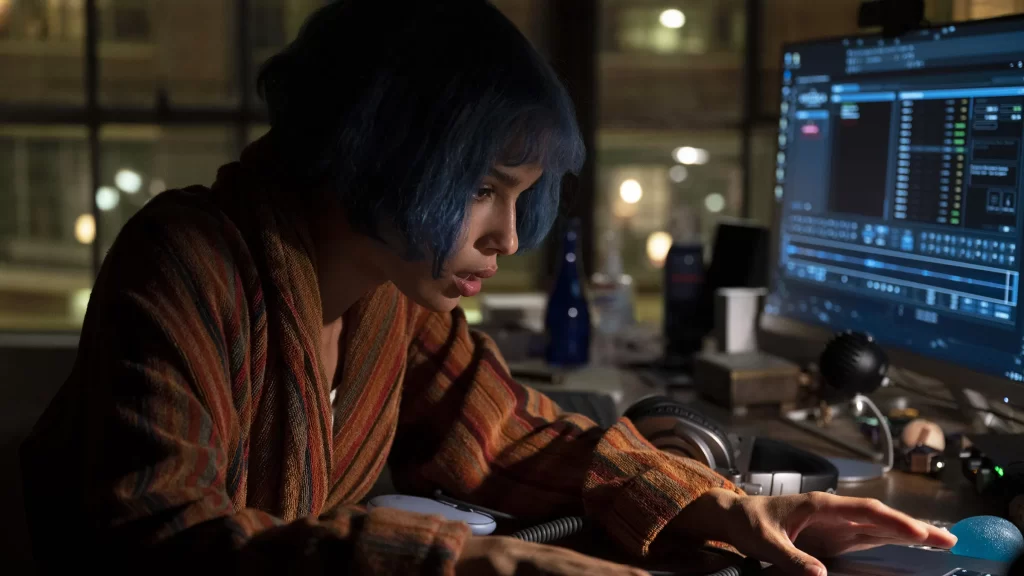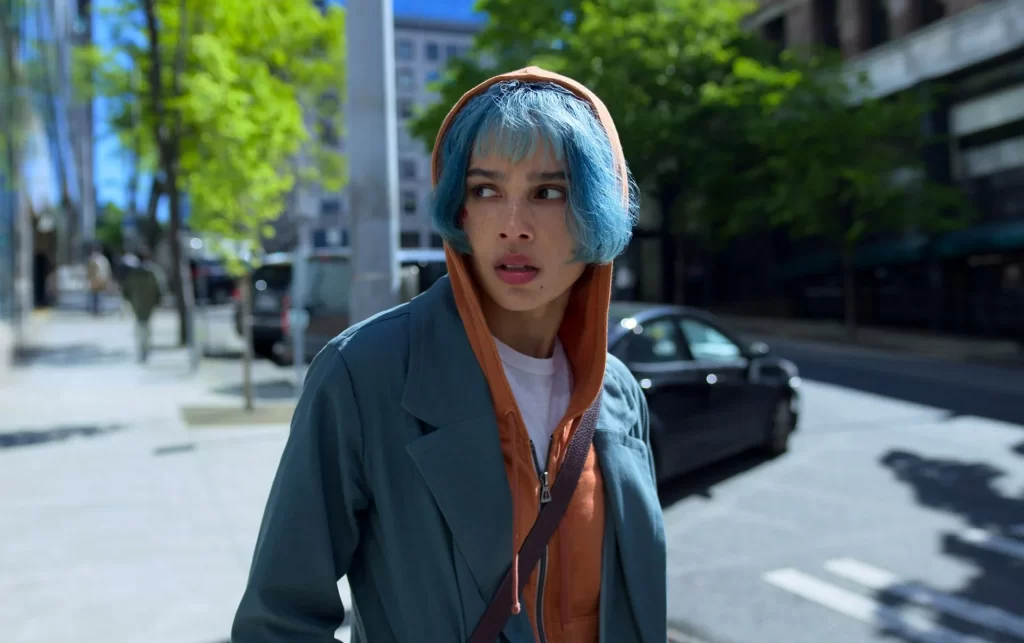
Steven Soderbergh routinely turns his camera into a bullhorn, using the crispness of his images (which he photographs himself, under the pseudonym Peter Andrews) to voice his displeasure with the ugliness of modern society. His latest picture, KIMI, gestures toward any number of topical themes: the physical and emotional aftershocks of the COVID-19 pandemic, the dystopian possibilities of the encroaching surveillance state, the venality and brutality of the corporate aristocracy. Yet despite glimpses of social-justice protests and hints of conspiratorial malfeasance, KIMI isn’t really a message movie. It is instead a lean and efficient thriller: 89 precisely calibrated minutes of setup, tension, and payoff.
The economy is often one of Soderbergh’s narrative preoccupations, but drop the article, and it becomes one of his artistic strengths. It’s a gift shared by KIMI’s hero, Angela (Zoë Kravitz), an adept computer programmer who spends her work-from-home days scrolling through audio streams and slicing her way through lines of code. In essence, she’s an interpreter for KIMI, the Echo-like smart device that Angela is paid to make even smarter, updating its software to recognize that “peckerwood” is an insult and “ME!” is a Taylor Swift song. Sleek and tastefully designed, KIMI is shaped like an eggshell-white cone, and she’s all ears; whenever you say her name, her base glows neon-pink and she cheerfully announces, “I’m here.” (Her soothing voice, supplied by Betsy Brantley, is virtually indistinguishable from Siri or Alexa.) Her purpose is service, and her persistent monitoring of her environment—she is, quite simply, always listening—is merely a method of continually enhancing her performance. Surely there are no downsides to this sort of thing.

Besides, Angela has other things to worry about. COVID may have turned all of us into temporary agoraphobes, but its omnipresent specter hit her especially hard, compounding the trauma she previously suffered during an unspecified assault. Now she’s constantly fluttering her hands after applying sanitizer and checking the three deadbolts on the door of her Seattle loft, which she never leaves; on the rare occasions when she screws up the courage to even enter the hallway, its walls seem to close in on her, like a horror-movie version of Inception, forcing her back inside. Soderbergh exhibits real zeal in embellishing her distress, deploying canted angles and forced perspective to emphasize her panic and disorientation.
Angela is no weakling, though. Provided she’s safely nuzzled within her tidy domain, she’s steely and assertive, whether she’s sending booty texts to the hot lawyer (Byron Bowers) who lives across the street or firmly reminding the upstairs contractors of their agreement not to use power tools. Kravitz, who showcased a wonderfully wry quality as a distaff John Cusack in Hulu’s short-lived High Fidelity series, is a more commanding presence here, displaying a no-nonsense authority that only reinforces her spiky intelligence. With her electric-blue hair and taut bearing, Angela is often scared and also a little scary.

About that scared bit: The plot of KIMI, whose screenplay comes from genre veteran David Koepp, basically combines Rear Window with Blow Out. While perusing a degraded audio file for work, Angela digitally stumbles onto sonic evidence of what sounds like a recent murder. (Her investigative process, in which she futzes with knobs and messes with sliders, is choreographed with surprising snap, in particular the sound design; the film appreciates the cocoon of blissful silence that materializes when tech nerds plop on their headphones to shut out the world.) Acting as both dutiful employee and concerned citizen, she attempts to escalate the issue, only to be met with unhelpful responses that range from confusion to indifference to hostility. When she finally makes headway (“We take this sort of thing very seriously,” an executive professes), it leads to a fraught encounter that feels like a sequel to the HR scene in The Assistant.
What begins as an irritating curiosity—“I always clear my list,” Angela declares when initially instructed to just let things lie—quickly (d)evolves into a breathless fight for survival and quest for justice, as our hero must overcome her anxieties and elude some very dangerous wet workers. Her adventure is enjoyable, suspenseful, and not especially persuasive. Koepp, integrating strains of his own past projects like Premium Rush and Panic Room, isn’t all that interested in creating memorable secondary characters, and despite the welcome emergence of Jaime Camil as chief heavy, the antagonists aren’t sufficiently menacing. For his part, Soderbergh adopts a minimalist approach to his set pieces, ditching the kinetic thrills of Haywire in favor of straightforward chasing and hiding.

This isn’t to say he’s phoning things in. There’s an enveloping intensity to Soderbergh’s craft, and his immersive technique—the sickly yellow lighting, the warped angles—allows him to infuse benign indoor spaces with a throb of alien foreboding. (He’s less successful when he tries to visualize Angela’s conceptions of the recording, recruiting Traffic’s Erika Christensen to appear in some intentionally hazy, ultimately pointless wisps of perceived violence.) His vision of American industry remains profoundly perverse; the office buildings we visit here feel leeched of life, possibly because middle-managers have assassins on speed dial.
And yet, perhaps the most notable thing about KIMI—aside from Kravitz’s confident performance—is the subtle shift it represents in its creator’s worldview. If last year’s No Sudden Move suggested a more jaundiced Soderbergh than the pop fantasist who remade Ocean’s Eleven, KIMI implies a modest degree of human optimism; it’s the work of a man who has faith in individual sovereignty, even when it’s ruthlessly ground down by the bootheel of corporate supremacy. Angela is more than just a capable coder and plucky problem-solver. She’s a refutation of that famous premise supplied by George Clooney in Ocean’s about the enduring dominance of institutions—a spirited, heartening reminder that the house doesn’t always win.
Grade: B
Jeremy Beck is the editor-in-chief of MovieManifesto. He watches more movies and television than he probably should.
